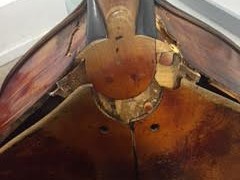Look what they did to my bass!
mainDavid Stark, principal double bass of the BBC National Orchestral of Wales, has sent us pictures from their recent tour of South America.
On a Jetcargo flight from Argentina to Chile, this is what baggage handlers did to the beautiful Neuner Hornsteiner bass belonging to section member Richard Gibbons.


Richard and the rest of the section are distraught.

When will airlines be held responsible for mishandling precious instruments that cannot be taken in cabin?





Comments